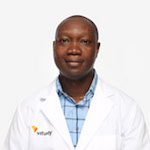Vituity is committed to helping residents navigate their careers. We are happy to provide tips from our physicians on some of the most common questions from residents, ranging from how to prepare for interviews, tips for selecting the right first job, and best practices for managing finances.
To give a first-hand perspective, we sat down with Philip Clarkson, MD, MSc., one of Vituity's rising stars who completed residency in 2017 and is already working as a hospitalist medical director.
You're very passionate about helping residents prepare for the future. What are some common challenges you see them facing?
First, residents need to understand the importance of planning ahead for their careers. We know that about half of new attendings end up changing jobs within five years. But moving early or often can be red flags to future employers. It's better to choose your first job wisely so you can stick around, establish yourself, and gain some experience.
When residents think ahead to that first attending job, they usually focus on two factors: location and pay. They haven't necessarily thought through other factors that affect their future career and happiness.
It can also be hard to identify the best offer, especially when you haven't yet practiced medicine in the real world. Senior residents get bombarded with calls and emails from recruiters (I remember one who insisted on speaking to me in the middle of my ICU shift!) who promise them the world.
They'll say something like, "You have the potential to earn $400,000!" What they don't tell you is that you'll have to work 20-plus shifts a month or that some huge chunk of the money is tied to some unattainable performance metrics. So it's theoretically possible to earn that income, but it's very impractical — and probably not the lifestyle you're looking for.
I understand that you attended Vituity Senior Residents' Weekend (SRW). What career planning insights did you take away from the event?
The discussion of practice models was a real eye-opener for me. Residents are generally W-2 employees and haven't necessarily been exposed to other models. And we know that new attendings tend to gravitate toward hospital and corporate employment — often because they perceive it as secure and predictable.
But at SRW, Vituity's Vice President of Hospital Medicine Surinder Yadav, MD, does an excellent job of breaking down the employment, locum, and partnership models and showing you the benefits and challenges of each. And another presenter, Chris Renner, talks about the financial implications of each practice model. For example, locums make more up front. But they then have to turn around and pay for their own health and malpractice insurances.
I also learned some useful tips on evaluating compensation packages. For example, it's important to factor in cost of living. A lot of providers want to work in urban locations. But those who do tend to earn less while paying more for housing and consumer goods. To some, it's worth it. But personally, I'm happy to work in a smaller California town, which is more affordable.
SRW also illuminated for me the complexities around bonuses. Physician compensation packages often include bonuses that are conditional on the entire group hitting certain metrics. It's one trick recruiters use to boost the "potential earnings" figure. Sure, you might make $400,000 a year if everyone in the group performs well. But that's out of your control and by no means a given.
Interviews can be one of the most nerve-wracking parts of the job search process. Any advice?
Before you start interviewing, take some time for reflection and research. Get very clear about what you want and don't want in your ideal job.
Then assemble a list of questions for the medical directors. Some examples:
- What schedules do your physicians work? Do you offer any flexibility around scheduling?
- What's the group culture? What expectations do your providers have of one another? How would you characterize your group's relationships with nursing and ancillary services?
- Which specialist consults are available to your physicians? How long do these typically take?
- What procedures do your physicians perform? Do they run codes? Is your ICU open or closed?
- What additional administrative duties do your physicians perform? For example, are they expected to sit on hospital-wide committees? Do they receive any stipends for these additional duties?
The answers to these questions should give you a pretty clear idea of how your day as a physician will look at different locations. Note which opportunities resonate with you and keep the conversation going after you leave. Hopefully some of these interviews will soon lead to on-site visits and offers.
You chose to complete an administrative fellowship after residency. How did that help to advance your career?
The administrative fellowship program was a huge factor in my decision to join Vituity. It really exposed me to a side of medicine I didn't see in medical school and residency.
For one thing, it's a fast track to leadership. In most practices, physicians work clinically for up to 10 years or even more before becoming medical directors. And many take that step without any formal training in leadership or business.
By contrast, Vituity's administrative fellows complete a business and leadership curriculum taught by some of the partnership's top physician executives. Fellows also attend operations and board meetings to learn not only the "how" but also the "why" behind the decision-making processes. These are lessons I could never learn from clinical work alone.
Fellows also complete a project in their area of interest. For example, I piloted an application to improve clinical documentation. This is an area I'm very passionate about, so it was an exciting experience. I would love to become Vituity's clinical documentation champion!
As a fellow, I was able to essentially do the work of an assistant medical director in my first year as an attending and to become a medical director in my first couple of years. It's wonderful to have these opportunities so early in my medical career.
Any additional words of advice for senior residents?
SRW is worth attending, even if you don't plan to pursue a job with Vituity. You'll get a helpful overview of what to expect as you transition from resident to attending. The speakers also help you clarify what you really want out of your first job, which will help you to ask the right questions no matter where you interview.
Another great thing about SRW is that it's pretty much free. Vituity helps cover your airfare and hotel. So think of it as a mini-rotation!
One final thought: last year, I gave a talk to the second-year internal medicine residents of UCSF Fresno, where I passed along many of the lessons I learned at SRW. The advice the presenters gave me has definitely stood the test of time. If anything, it rings even more true today.
###
2019 Senior Residents' Weekend for hospitalists will be held Friday and Saturday, August 23–24 in Chicago.
2019 Senior Residents' Weekend for emergency physicians will be held Friday and Saturday, August 9–10 in Chicago.
One night hotel and travel up to $500 is covered. And, if you accept an offer before Sept. 30, you will receive a $10,000 bonus. For more information, email ResidentEvents@vituity.com.
Originally published April 2, 2019.























